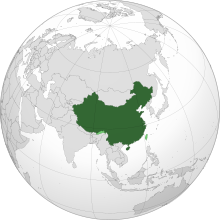LGBTQ rights in the People's Republic of China | |
|---|---|
 Territory controlled by the People's Republic of China shown in dark green; territory claimed but not controlled shown in light green | |
| Status | Legal since 1997[1] |
| Gender identity | Legal with Surgery |
| Military | Unknown |
| Family rights | |
| Recognition of relationships | Legal Guardianship System since 2017 |
| Adoption | Illegal |
Lesbian, gay, bisexual, transgender and queer (LGBTQ) people in the People's Republic of China (PRC) face legal and social challenges that are not experienced by non-LGBTQ residents. While both male and female same-sex sexual activity are legal, same-sex couples are currently unable to marry or adopt, and households headed by such couples are ineligible for the same legal protections available to heterosexual couples. No explicit anti-discrimination protections for LGBTQ people are present in its legal system, nor do hate crime laws cover sexual orientation or gender identity.
Homosexuality and homoeroticism in China have been documented since ancient times. Historical discrimination towards homosexuality in much of the region include the ban on homosexual acts enforced by Genghis Khan in the Mongol Empire, which made male homosexuality punishable by death.[2][3]
As early as the 17th century, the Manchu–ruled Qing courts began to use the term jījiān (雞姦) for homosexual anal intercourse. In 1740, an anti-homosexual decree was promulgated, defining voluntarily homosexual intercourse between adults as illegal. The punishment allegedly included a month in prison and 80 heavy blows with heavy bamboo.[4] Homosexuality was legal during Maoist China (1949–1976).[5] In the 1980s, the subject of homosexuality reemerged in the public domain and gay identities and communities have expanded in the public eye since then. However, the studies note that public discourse in China appears uninterested and, at best, ambivalent about homosexuality, and traditional sentiments on family obligations and discrimination remains a significant factor deterring same-sex attracted people from coming out.[5]
Since the late 2010s, authorities have avoided showing homosexual relationships on public television, as well as showing effeminate men in general.[6] Under the Xi Jinping administration, LGBTQ venues and events have been forced to shut and LGBTQ rights activists have become subject to greater scrutiny by the country's system of mass surveillance.[7][8]
- ^ Cite error: The named reference
ILGAwas invoked but never defined (see the help page). - ^ Onon, Urgunge (2001). The secret history of the Mongols : the life and times of Chinggis Khan. Richmond, Surrey: Curzon. ISBN 0-7007-1335-2. OCLC 50664183.
And anyone found indulging in homosexual practices should be executed
- ^ "Genghis Khan's constitutional ban on homosexuality revealed". 29 August 2007. Archived from the original on 11 September 2018. Retrieved 21 August 2024.
- ^ "History of Homosexuality". china.org.cn. Shanghai Star. Archived from the original on November 19, 2003. Retrieved 26 November 2016.
- ^ a b Jeffreys, Elaine; Yu, Haiqing (2015). Sex in China. Polity. ISBN 978-0-7456-5613-7.
- ^ Ellis-Petersen, Hannah (2016-03-04). "China bans depictions of gay people on television". The Guardian. ISSN 0261-3077. Archived from the original on 2020-03-09. Retrieved 2024-06-28.
- ^ "Roxie, one of China's few lesbian bars, closes its doors". The Economist. 2024-06-27. ISSN 0013-0613. Archived from the original on 2024-06-27. Retrieved 2024-06-28.
Earlier this month the bar announced that it would close. It blamed "forces beyond our control", a euphemism for official pressure.
- ^ Wang, Vivian (2024-05-25). "Xi Jinping's Recipe for Total Control: An Army of Eyes and Ears". The New York Times. ISSN 0362-4331. Archived from the original on 2024-05-25. Retrieved 2024-05-30.